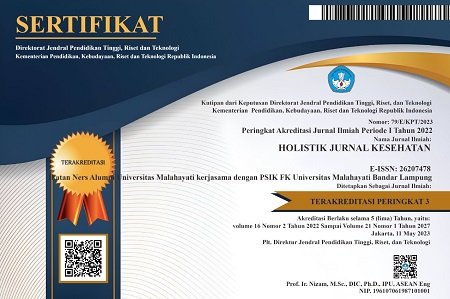Metacognitive training pada pasien dengan skizofrenia: A literature review
Abstract
Background: Schizophrenia is a psychotic disorder characterized by major disturbances in thoughts and emotions. Patients with schizophrenic disorders have disturbances in cognitive function characterized by disturbances in the cognitive system, so metacognitive training therapy is needed. Metacognitive Training Therapy is a combination of psychoeducation, cognitive remediation therapy and cognitive behavioral therapy aimed at reducing the overall severity of symptoms and improving several neurocognitive subdomains and social cognitive functions.
Purpose: This study aims to identify metacognitive training interventions in patients with schizophrenia.
Method: The databases used were EBSCOhost (Cinahl) and Pubmed and 159 articles were found.
Results: Stage through the initial selection obtained 32 articles. Then, articles were selected based on inclusion criteria in the form of publications in the last 10 years (2013-2023), national and international journals in Indonesian and English, articles with full text, and 5 peer-reviewed articles. Next, articles were selected based on research title, country, research objectives, research methods, population and sample, and research results.
Conclusion: This study found that participants who had quite severe symptoms at the start of training were greatly helped in reducing the overall severity of symptoms by the metacognitive therapy they underwent.
Keywords: Metacognitive; Schizophrenia; Training.
Pendahuluan: Skizofrenia merupakan gangguan psikotik yang ditandai dengan gangguan utama dalam pikiran dan emosi. Pada pasien dengan gangguan skizofrenia memiliki gangguan dalam fungsi kognitif ditandai dengan adanya gangguan sistem kognitif sehingga diperlukan terapi Metacognitive Training. Terapi Metakognitif Training merupakan gabungan dari psikoedukasi, terapi remediasi kognitif dan terapi kognitif perilaku bertujuan untuk menurunkan keparahan gejala secara keseluruhan serta memperbaiki beberapa subdomain neurokognitif dan fungsi kognitif sosial.
Tujuan: Penelitian ini bertujuan untuk mengidentifikasi intevensi metacognitive training pada pasien dengan skizofrenia.
Metode: Database yang dilakukan adalah EBSCOhost (Cinahl) dan Pubmed dan ditemukan sebanyak 159 artikel.
Hasil: Tahap melalui seleksi awal diperoleh 32 artikel. Kemudian, artikel diseleksi berdasarkan kriteria inklusi berupa terbit 10 tahun terakhir (2013-2023), jurnal nasional maupun internasional yang berbahasa Indonesia dan Inggris, artikel dengan full text, dan artikel yang peer reviewed didapatkan sebanyak 5 artikel. Selanjutnya, artikel diseleksi berdasarkan judul penelitian, negara, tujuan penelitian, metode penelitian, populasi dan sampel, dan hasil penelitian.
Simpulan: Penelitian ini menemukan bahwa peserta yang memiliki gejala-gejala yang cukup parah pada awal pelatihan sangat dibantu dalam menurunkan keparahan gejala secara keseluruhan oleh terapi metakognitif yang dijalani.
Keywords
References
Afconneri, Y., & Puspita, W. G. (2020). Faktor-faktor kualitas hidup pasien skizofrenia. Jurnal keperawatan jiwa, 8(3), 273-278.
Balzan, R. P., Mattiske, J. K., Delfabbro, P., Liu, D., & Galletly, C. (2019). Individualized metacognitive training (MCT+) reduces delusional symptoms in psychosis: a randomized clinical trial. Schizophrenia Bulletin, 45(1), 27-36.
Bowie, C. R., Bell, M. D., Fiszdon, J. M., Johannesen, J. K., Lindenmayer, J. P., McGurk, S. R., & Wykes, T. (2020). Cognitive remediation for schizophrenia: an expert working group white paper on core techniques. Schizophrenia Research, 215, 49-53.
Chen, Q., Sang, Y., Ren, L., Wu, J., Chen, Y., Zheng, M., & Sun, H. (2021). Metacognitive training: a useful complement to community-based rehabilitation for schizophrenia patients in China. BMC psychiatry, 21, 1-10.
Cuijpers, P. (2019). Targets and outcomes of psychotherapies for mental disorders: an overview. World Psychiatry, 18(3), 276-285.
De Jong, S., Van Donkersgoed, R. J. M., Timmerman, M. E., Aan Het Rot, M., Wunderink, L., Arends, J.,& Pijnenborg, G. H. M. (2019). Metacognitive reflection and insight therapy (MERIT) for patients with schizophrenia. Psychological medicine, 49(2), 303-313.
Fekete, Z., Vass, E., Balajthy, R., Tana, Ü., Nagy, A. C., Oláh, B., & Kuritárné, I. S. (2022). Efficacy of metacognitive training on symptom severity, neurocognition and social cognition in patients with schizophrenia: A single‐blind randomized controlled trial. Scandinavian Journal of Psychology, 63(4), 321-333.
Fiszdon, J. M., Bryson, G. J., Wexler, B. E., & Bell, M. D. (2004). Durability of cognitive remediation training in schizophrenia: performance on two memory tasks at 6-month and 12-month follow-up. Diakses dari: https://pubmed.ncbi.nlm.nih.gov/14967547/
Hasson‐Ohayon, I., Igra, L., Lavi‐Rotenberg, A., Goldzweig, G., & Lysaker, P. H. (2023). Findings from a randomized controlled trial of Metacognitive Reflection and Insight Therapy for people with schizophrenia: Effects on metacognition and symptoms. Psychology and Psychotherapy: Theory, Research and Practice.
Kementerian Kesehatan Republik Indonesia. (2022). Definisi Mental Illnes (Gangguan Mental). Diakses dari : https://yankes.kemkes.go.id/view_artikel/1314/definisi-mental-illnessgangguan-mental
Lopez-Morinigo, J. D., Ajnakina, O., Martínez, A. S. E., Escobedo-Aedo, P. J., Ruiz-Ruano, V. G., Sánchez-Alonso, S., & David, A. S. (2020). Can metacognitive interventions improve insight in schizophrenia spectrum disorders? A systematic review and meta-analysis. Psychological medicine, 50(14), 2289-2301.
Kuokkanen, R., Lappalainen, R., Repo‐Tiihonen, E., & Tiihonen, J. (2014). Metacognitive group training for forensic and dangerous non‐forensic patients with schizophrenia: A randomised controlled feasibility trial. Criminal Behaviour and Mental Health, 24(5), 345-357.
Lysaker, P. H., & Dimaggio, G. (2014). Metacognitive capacities for reflection in schizophrenia: implications for developing treatments. Schizophrenia bulletin, 40(3), 487-491.
McCutcheon, R. A., Marques, T. R., & Howes, O. D. (2020). Schizophrenia—an overview. JAMA psychiatry, 77(2), 201-210.
Sari, D. N., & Yulianto, S. (2022). Pengaruh Terapi Metakognitif Pada Pasien Skizofrenia Dengan Halusinasi Di Bangsal Larasati Rsjd Dr. Arif Zainudin Surakarta. Diakses dar: https://eprints.ukh.ac.id/id/eprint/4440/1/NASPUB%20DINAA.pdf
So, S. H. W., Chan, A. P., Chong, C. S. Y., Wong, M. H. M., Lo, W. T. L., Chung, D. W. S., & Chan, S. S. (2015). Metacognitive training for delusions (MCTd): effectiveness on data-gathering and belief flexibility in a Chinese sample. Frontiers in Psychology, 6, 730.
Sovitriana, R. (2019). Dinamika Psikologis Kasus Penderita Skizofrenia. Uwais Inspirasi Indonesia.
Wittchen, H. U., Mühlig, S., & Beesdo, K. (2022). Mental disorders in primary care. Dialogues in clinical neuroscience.
World Health Organization. (2022). Mental Disorders. Diakses dari: https://www.who.int/news-room/fact-sheets/detail/mental-disorders
Zahnia, S., & Sumekar, D. W. (2016). Kajian epidemiologis skizofrenia. Jurnal Majority, 5(4), 160-166.
DOI: https://doi.org/10.33024/hjk.v17i8.12096
Refbacks
- There are currently no refbacks.
Copyright (c) 2023 Holistik Jurnal Kesehatan

This work is licensed under a Creative Commons Attribution-NonCommercial 4.0 International License.














